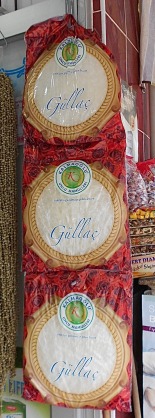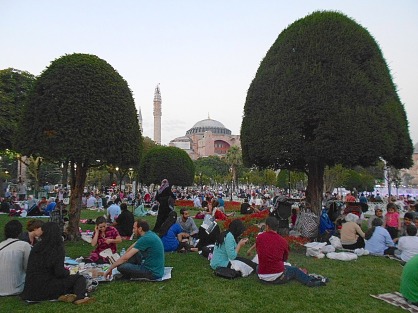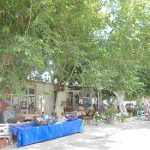Travelling in Turkey during Ramadan (Ramazan in Turkish), the Muslim month of fasting, can be a wonderful experience provided you know what to expect. During this 30-day period Muslims are expected to refrain from eating, drinking or smoking from dawn to dusk, a tall order in the great heat of summer, especially when it’s also the height of the tourist season and so people must keep on working very long days.
If you travel to İstanbul or the Aegean and Mediterranean coasts you may not be terribly aware of Ramazan as restaurants stay open during the day and not every Turk takes part in the fast anyway. If, on the other hand, you travel into the heart of Anatolia and especially to the east of the country you should assume that most of your hosts will be fasting which can lead to exhaustion and frayed tempers towards the end of the day. Even in Cappadocia perhaps 75% of locals – and this particularly applies to people like the bed-makers – will stick to the fast. Most are very accommodating of tourists who want to continue eating, drinking and smoking during the day although most will also appreciate it if you try not to do this in front of them.
There are many rituals and traditions associated with Ramazan that you might like to watch out for, especially in İstanbul.
Almost everywhere in Turkey fasters are woken up before dawn so that they can eat a special breakfast (sahur) to set them up for the long day ahead of them. Wake-up calls are provided by Ramazan drummers (davulcus) who come round the streets knocking on every door to make sure no one oversleeps, something some tourists appreciate more than others. This does not happen in the tourist enclave of Sultanahmet in İstanbul although it does in other parts of the city.
As the day wears on all thoughts are fixed on iftar, the meal that is eaten at the end of the fasting period, usually with family and friends. Many authorities set up iftar tents (iftar çadırı) where a communal meal is served to the anyone who wants it. The time of iftar varies slightly depending on where you are in the country but is signalled by the start of the call to prayer or (rarely these days) by the firing of a cannon.
Favourites for breaking the fast are dates, the treat with which the Prophet Muhammed is believed to have broken his own fast. Women usually go to a lot of trouble over menus for iftars and many people actually put on weight rather than losing it over Ramazan. Look out in particular for a pudding called güllaç that is flavoured with rosewater and is rarely available outside this time of year. Also popular are special roundels of pide bread. Güllaç wafers on sale in KütahyaThere will be queues outside the most popular bakeries just before iftar.
Güllaç wafers on sale in KütahyaThere will be queues outside the most popular bakeries just before iftar.
Many hotels and restaurants lay on special iftar menus for their guests. These range from the simple and straightforward to slap-up and pricy mini-banquets in the five-star hotels.
To get a feel for Ramazan you might want to head to Eyüp at the end of the Golden Horn which is İstanbul’s most holy neighbourhood and inclined to take the fasting month particularly seriously. For something more light-hearted head for the Hippodrome in Sultanahmet where entertainment if usually laid on post-iftar.
This year Ramazan in Turkey will end on 7 August to be followed by Şeker (Ramazan) Bayramı (the Sweets Holiday), a three-day public holiday when banks, post offices etc will be closed. Some private companies will also close for an entire week so make sure that you are prepared.
Written: 13 July 2013
See also: The Eyüp Iftar Experience


